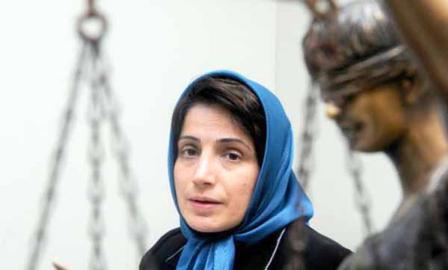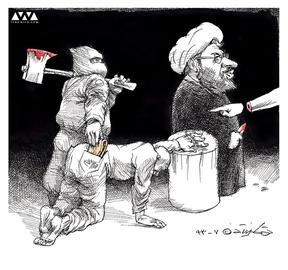
The Iranian Bar Association banned the human rights lawyer Nasrin Sotoudeh from practicing law for three years on October 17, after Tehran’s prosecutor filed a complaint against her. It is the first time in its decades-long history that the association has disqualified a lawyer.
The legal battle began in August 2010, when Sotoudeh was arrested and charged with propaganda against the regime and actions against national security, and kept in solitary confinement at Evin Prison. Twice during her detainment, she went on hunger strike in protest of her treatment. The Lower Revolutionary Court initially sentenced her to 11 years in prison with a 40-year ban on practicing law. However, in September 2011, the sentence was reduced by an appeals court, which ruled for a six-year prison term with a 10-year ban on practicing law.
Sotoudeh’s arrest and sentencing led to international outcry from human rights organizations, including Amnesty International, the International Commission of Jurists, the International Federation for Human Rights, the Iranian League for the Defense of Human Rights, the Union Internationale des Avocats and the World Organization Against Torture.
Then, on September 18, 2013, shortly after Hassan Rouhani was elected president, authorities released 11 prisoners of conscience, included Sotoudeh; no explanation was provided.
The ban on Sotoudeh’s practice was not lifted, but, by Iranian law, the Revolutionary Court’s verdict had no legal standing given that it is only the Bar Association that can grant, suspend or revoke a lawyer’s permit and it had already renewed Sotoudeh’s.
Twice Tehran’s prosecutor filed a complaint with the Disciplinary Tribunal of the Iranian Bar Association asking for the suspension of her permit. The first time she was acquitted, as of October 17, she faces a three-year suspension. Though it is the first time the bar association has taken steps to strip a lawyer of his or her license, in recent years, legal professionals have complained that the independence and integrity of the membership organization has increasingly been undermined. More often than not, when a lawyer is arrested or charged, the association has failed to offer adequate support. Lawyers also say that there is increased pressure on the association from the Intelligence Ministry, as well as from influential individuals like Tehran’s prosecutor.
IranWire spoke to Nasrin Sotoudeh about the verdict, the events that led to it and how she felt about the decision.
Was the decision to ban you from practicing law unexpected?
It was apparent to me, from the atmosphere during the trial, that a verdict like this was coming, especially given when the judge said to me near the end that I needed to “understand the particularities of the situation.” This statement and the judges’ attitudes during the trial left me with no doubt that the verdict was going to be biased and that the judges had given in to pressures from the Intelligence Ministry.
In a previous interview you said that if the atmosphere of the trial was dictated by security agents you would not defend yourself. What was the mood like?
I said that if on the day of my trial, security forces wearing civilian clothes were present in the court, I wouldn’t defend myself. On this occasion, this didn’t happen, but there was definitely a tense atmosphere. Over the past few months there’s been a lot of communication regarding my case between the Bar Association, the prosecution, the security police and the Intelligence Ministry. Also, four previous directors of the Bar Association were summoned to the Security Court at Evin Prison.
What did you do in the face of these pressures?
Because I didn’t know they’d already come to a verdict, I wrote a letter to the Bar Association on October 8 in which I asked that my case not proceed until every external pressure on the association stop as it was crystal clear that these would prevent the tribunal from acting impartially.
In the verdict, it repeatedly refers to the plaintiff as “honorable”. Why do the judges refer to plaintiffs as such? Is it because they’re worried we’re more honorable than they are? Whatever the reason, the tribunal forgot impartiality when it came to making its decision.
Is this the first time that the Bar Association has banned a lawyer from practicing?
In terms of civil lawyers, yes, this is the first time. Both before and after the 2009 revolution, the association has been under pressure to revoke or suspend the permits of lawyers engaged in activism. But it never did. Before the revolution, the association didn’t give in to the verdicts of the military tribunals and, even after 2009, it didn’t give in to the Revolutionary Court. However, with the ban they’ve given me, they’ve basically announced that from this point onwards the Revolutionary Court makes the final decision.
The Bar Association recently held elections. Did this have anything to do with the verdict?
In the past seven months, there were two elections at the association. The first was for the board of directors, in which the Islamic Judiciary intervened directly, and the other was for the disciplinary tribunal. The disciplinary tribunal rejected a number of good and honest lawyers from its board. I suspect that it only suggested individuals who were recommended by the Intelligence Ministry. In any case, great lawyers like Farideh Ghairat were replaced. Both these elections played a part in my verdict.
Do you plan to appeal?
I won’t appeal because what the Intelligence Ministry does at the moment is impose someone’s fate on to his or her colleagues. In this particular instance, the Intelligence Ministry wanted to keep its hands clean and give the Bar Association a bad name by holding those who came to the decision accountable –this is a ruling that has no precedence in the 75 years that the Bar Association has been running.
Then how will you defend your rights?
I won’t complain to the judiciary, as I firmly believe it’s the Bar Association that is responsible. If the verdict was justified, then it needs to explain why and if it wasn’t then it needs to find a way to correct the error.
I’ve been told that some of the tribunal judges were summoned to the prosecutor’s office at Evin Prison, were charged and are now free on bail. Under these circumstances, how is a judge able to give an honest verdict? I have no doubt that the tribunal judges Navvabeh Stahbodi, Majed Vosoughi and Mir Ghaedi, who issued the verdict, were under intense pressure.
visit the accountability section
In this section of Iran Wire, you can contact the officials and launch your campaign for various problems

























comments